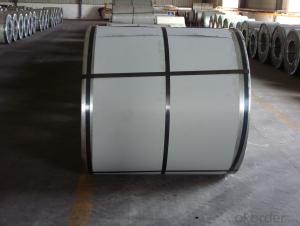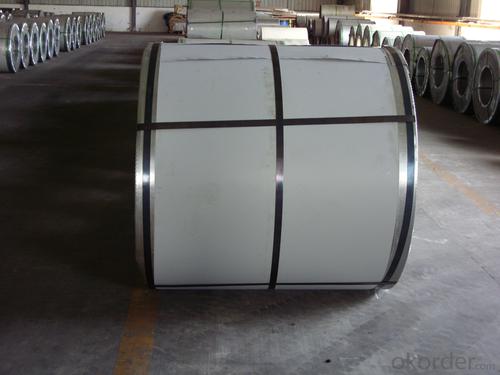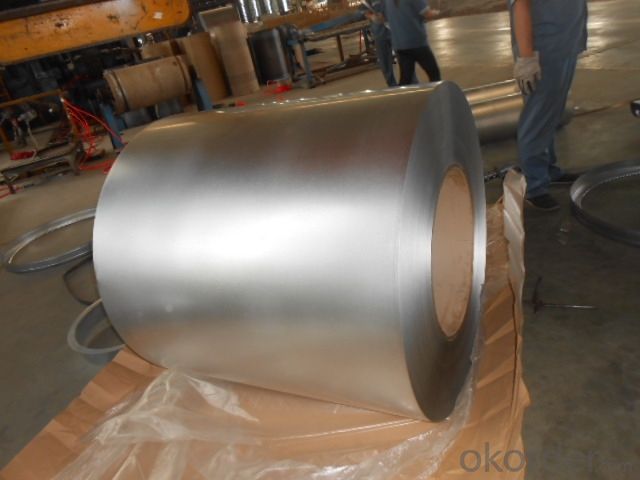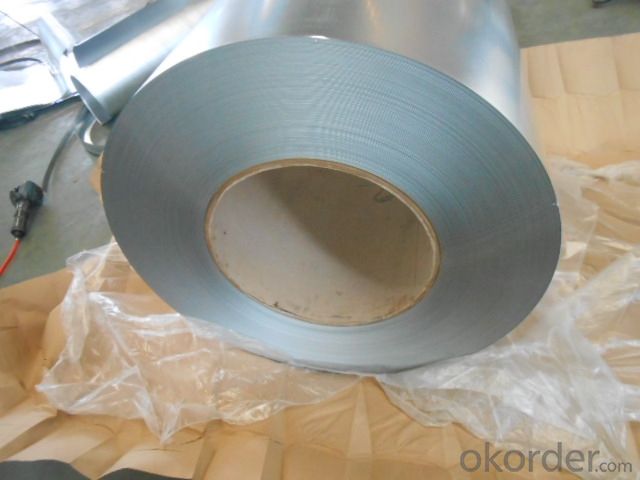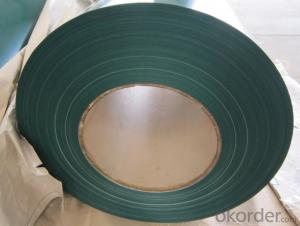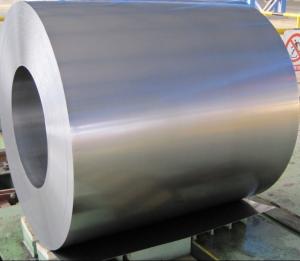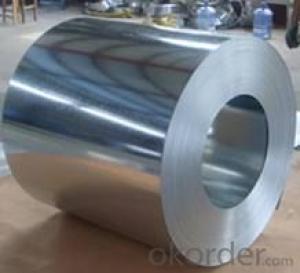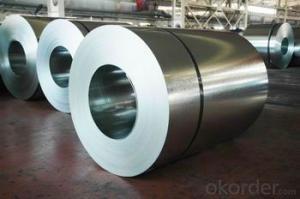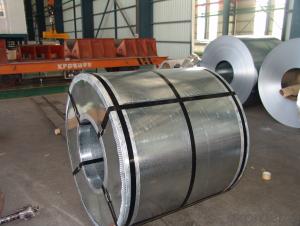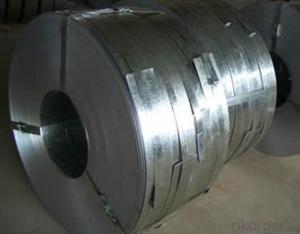GALVANIZED STEEL IN COIL
- Loading Port:
- China Main Port
- Payment Terms:
- TT OR LC
- Min Order Qty:
- -
- Supply Capability:
- -
OKorder Service Pledge
OKorder Financial Service
You Might Also Like
Product Description:
Commodity | Hot dip galvanized steel coil and sheet |
Technical Standard: | JIS 3302 / ASTM A653 / EN10143 |
Grade | DX51D / DX52D/ DX53D/ S250,280,320GD |
Types: | Commercial / Drawing / Deep Drawing / Structural quality |
Width | 500/650/726/820/914/1000/1200/1219/1220/1250mm |
Thickness | 0.12-2.8mm |
Type of coating: | Galvanized |
Zinc coating | Z30-275g/m2 |
Surface Treatment | Chromed / Skin-pass/ Oiled/Slightly Oiled/ Dry/ Anti-fingerprint |
Surface structure: | Zero spangle / minimized spangle / regular spangle/ big spangle |
ID coil | 508mm or 610mm |
Coil weight | 3-8 MT per coil |
Package: | Properly packed for ocean freight exportation in 20''containers |
Application: | Industrial panels, roofing and siding for painting |
Price terms | FOB,CFR,CIF |
Payment terms | T/T or L/C |
Delivery time | Within 30 days |
Remarks | Insurance is all risks |
MTC will be handed on with shipping documents | |
We accept the third party certification test,such as SGS/BV |
Technical data :
Hot dipped galvanized coil Technical Data
Chemical Composition | ||||||
GRADE | C | Si | Mn | P | S | Ti |
SGCC/DX51D+Z | ≤0.10 | ≤0.50 | ≤0.60 | ≤0.10 | ≤0.030 | ≤0.020 |
DX52D+Z | ≤0.10 | ≤0.50 | ≤0.60 | ≤0.10 | ≤0.030 | ≤0.020 |
SGCD/DX53D+Z | ≤0.10 | ≤0.30 | ≤0.50 | ≤0.05 | ≤0.030 | ≤0.020 |
SGCE/DX54D+Z | ≤0.10 | ≤0.30 | ≤0.30 | ≤0.03 | ≤0.020 | ≤0.020 |
DX56D+Z | ≤0.10 | ≤0.30 | ≤0.30 | ≤0.03 | ≤0.020 | ≤0.020 |
Structural | ≤0.20 | ≤0.60 | ≤1.70 | ≤0.10 | ≤0.045 | |
|
|
|
|
|
| |
Hot dipped galvanized steel coil Mechanical Properties | |||
GRADE | Yield Strength MPa | Tensile Strength MPa | Elongation % |
SGCC(DX51D+Z) | ≥205 | ≥270 | - |
SGCD(DX53D+Z) | - | ≥270 | 38 |
SGCE(DX54D+Z) | - | ≥270 | 40 |
DX56D+Z | - | ≥270 | 42 |
- Q: How are steel coils used in the production of HVAC ductwork?
- Due to their durability and strength, steel coils find widespread use in the production of HVAC ductwork. Galvanized steel is typically used to make these coils, as it offers protection against corrosion and extends the lifespan of the ductwork. To initiate the manufacturing process, the steel coils are unrolled and cut to the desired length. Subsequently, they are passed through a machine that shapes the steel into either a rectangular or round duct form. This shaping process employs various techniques like roll forming or press braking. Once the steel has taken the desired duct shape, it is joined together using different methods such as welding or locking mechanisms. Rectangular ducts are commonly welded, while round ducts often incorporate locking mechanisms like snap locks or Pittsburgh seams. These joining techniques ensure the ductwork is secure and airtight. Following the assembly of the ductwork, additional processes like insulation or lining may be applied. Insulation aids in minimizing heat loss or gain, while lining improves the acoustic properties of the ductwork. These supplementary steps are often undertaken to comply with specific requirements or regulations. In conclusion, steel coils are essential in the production of HVAC ductwork due to their strength, durability, and corrosion protection. Steel's versatility allows for the fabrication of ductwork in various shapes and sizes, making it a popular choice for HVAC systems.
- Q: What are the different types of steel coil processing equipment?
- In the manufacturing industry, various types of steel coil processing equipment are utilized. These equipment are specifically designed to handle and process steel coils in different ways, enabling efficient and precise production. Some commonly used steel coil processing equipment are as follows: 1. Decoilers: These machines are employed to unwind steel coils and feed them into the processing line. Equipped with motorized systems, they ensure a steady supply of material by controlling the unwinding process. 2. Straighteners: The purpose of straighteners is to flatten and straighten steel coils that may have become distorted during the coiling process. By utilizing a series of rollers, they eliminate any bends or waves, guaranteeing a smooth and consistent feed to the next processing stage. 3. Slitters: Slitters are responsible for cutting steel coils into narrower strips, allowing the production of various widths of steel sheets or strips. They consist of multiple sets of adjustable circular blades used to achieve the desired width. 4. Levelers: Levelers are utilized to correct any surface imperfections in steel coils, such as wavy or undulating surfaces. By means of a series of rollers, they apply pressure and reshape the material, resulting in a flat and uniform surface. 5. Shears: Shears are used to precisely cut steel coils into specific lengths. They can be either hydraulic or mechanical and are designed to provide clean and accurate cuts, ensuring the desired dimensions are achieved. 6. Recoilers: Recoilers are essential for rewinding processed steel coils back into tightly wound coils. They can be either motorized or manual and are crucial for storage and transportation purposes. 7. Edge trimmers: These machines are employed to remove any excess material from the edges of steel coils. By ensuring a clean and consistent edge, they enable better handling and further processing. 8. Coil cars: Coil cars are utilized for the transportation of steel coils within the processing facility. They are equipped with hydraulic or mechanical systems, facilitating easy loading and unloading of coils onto other equipment. These represent only a few examples of the diverse range of steel coil processing equipment used in the industry. Each piece of equipment plays a vital role in the manufacturing process, ensuring the efficient production of high-quality steel products.
- Q: How are steel coils heat treated?
- Steel coils are heat treated using a process called annealing. Annealing is a heat treatment technique in which the steel coils are heated to a specific temperature and then slowly cooled down. This process helps to relieve any internal stresses within the steel, improve its mechanical properties, and enhance its overall performance. The heating process involves raising the temperature of the steel coils to a critical point, typically between 800°C and 900°C, depending on the specific grade and desired outcome. The coils are then held at this temperature for a specific period of time, allowing for the transformation of the steel's microstructure. Once the desired time has elapsed, the heated steel coils are slowly cooled down in a controlled manner. This slow cooling process is vital as it allows the steel to undergo a gradual transformation, resulting in a more uniform and refined microstructure. This controlled cooling also helps to minimize the formation of internal stresses, which can potentially weaken the steel. The annealing process can be performed in different atmospheres, such as air, nitrogen, or hydrogen. The choice of atmosphere depends on the specific requirements and properties desired for the steel coils. For instance, annealing in a protective atmosphere like nitrogen or hydrogen can help prevent oxidation or decarburization of the steel surface. Overall, heat treating steel coils through annealing is a critical step in enhancing their mechanical properties, improving their formability, and achieving the desired characteristics for various industrial applications.
- Q: I want to anodize steel using heat. some steel turns gray instead of coloring when I heat it up using a torch.
- Steel doesn't anodize in the sense that aluminum and some other metals do. However, it can be heat-colored. The trick is to clean the surface first (it must be oxide free), then heat gently until the colors appear. These are called temper colors in steel. They are due to a thin adherent layer of oxide that forms and thickens as temperature is increased. They are quite temperature dependent. As the steel is heated, the first color to appear is pale yellow. This will progress through darker yellows, browns, purples, and blues as the temperature rises. Above blue, the oxide becomes the gray/black color you are apparently getting - this is the result of heating too fast and too hot. See the chart at the site below for colors in plain carbon steel. Note that the temperatures are pretty low - It all starts around 400 F and if you go above 600 F the show's all over.
- Q: What are the different coil coatings available for steel coils?
- There are several different coil coatings available for steel coils, each offering unique benefits and characteristics. Here are some of the most common coil coatings used in the industry: 1. Polyester: Polyester coil coatings are widely used due to their excellent durability and resistance to fade, scratch, and corrosion. They provide good UV resistance and are available in a wide range of colors. 2. Polyvinylidene fluoride (PVDF): PVDF coatings are known for their exceptional resistance to weathering and UV radiation. They offer excellent color retention, gloss retention, and overall durability, making them suitable for outdoor applications. 3. Polyurethane: Polyurethane coil coatings provide a high level of abrasion resistance and flexibility. They offer excellent chemical resistance and are often used in industries such as automotive and appliances. 4. Silicone modified polyester (SMP): SMP coatings offer good resistance to fading, chalking, and cracking. They provide excellent weather resistance and are commonly used in architectural applications. 5. Epoxy: Epoxy coil coatings are known for their excellent adhesion and chemical resistance. They are often used in demanding environments such as automotive parts and appliances. 6. Plastisol: Plastisol coatings are PVC-based and provide a thick, flexible film on the surface of the steel coil. They offer excellent corrosion resistance and are commonly used in the construction industry. These are just a few examples of the different coil coatings available for steel coils. The choice of coating depends on factors such as the intended application, environmental conditions, desired appearance, and required performance characteristics. Consulting with a coil coating expert can help determine the most suitable coating for a specific project.
- Q: How are steel coils used in the manufacturing of steel drums?
- Steel coils are used in the manufacturing of steel drums by being cut into sheets and then formed into cylindrical shapes, which serve as the main body of the drum. These coils provide the necessary strength and durability required for holding and transporting various materials.
- Q: What is the role of steel coils in the production of pipes and tubes?
- Steel coils play a crucial role in the production of pipes and tubes as they serve as the primary raw material. These coils are unwound and undergo various processes such as cutting, bending, and shaping to form the desired pipe or tube shape. The steel coils provide the necessary strength, durability, and structural integrity to the final product, ensuring that pipes and tubes can withstand high pressure, corrosion, and other demanding conditions.
- Q: Can anyone tell me what that means. I have seen it on knife blades an such. I am assuming it's a formula for the strength of the metal. who does that scale work, and please keep it simple.
- 440 is an AISI (American Iron and Steel Institute) material specification. It specifies the precise quantities of carbon and other elements present in the alloy. Here are the constituents of AISI 440 steel: Carbon - 0.6 to 0.75% Chromium - 16 to 18% Manganese - less than 1% Molybdenum - less than 0.75% Phosphorus - less than 0.04% Silicon - less than 1% Sulfur - less than 0.03% Iron makes up the remainder. AISI 440 is a heat-treatable, precipitation-hardening stainless steel.
- Q: Can steel coils be cut?
- Yes, steel coils can be cut.
- Q: We are going to build a house with a steel frame.Someone told me today that these houses have problems with humidity.Is that true?Please tell me all you know..
- That's a first for me. The only draw back to a steel frame home is the cost, not only in material but also in labor. They do make a great home with proper installation. Make sure your contractor and framing crew have experience with metal frame construction. There is some differences in building codes, etc. Good Luck and happy building.
Send your message to us
GALVANIZED STEEL IN COIL
- Loading Port:
- China Main Port
- Payment Terms:
- TT OR LC
- Min Order Qty:
- -
- Supply Capability:
- -
OKorder Service Pledge
OKorder Financial Service
Similar products
Hot products
Hot Searches
Related keywords
